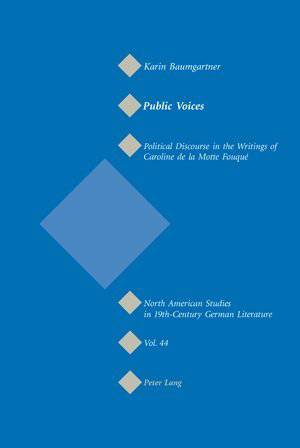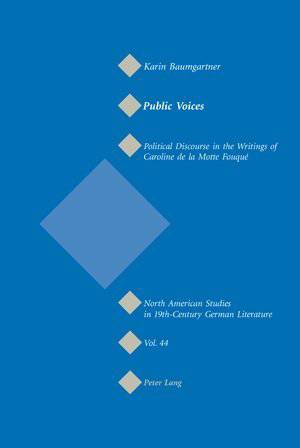
Bedankt voor het vertrouwen het afgelopen jaar! Om jou te bedanken bieden we GRATIS verzending (in België) aan op alles gedurende de hele maand januari.
- Afhalen na 1 uur in een winkel met voorraad
- In januari gratis thuislevering in België
- Ruim aanbod met 7 miljoen producten
Bedankt voor het vertrouwen het afgelopen jaar! Om jou te bedanken bieden we GRATIS verzending (in België) aan op alles gedurende de hele maand januari.
- Afhalen na 1 uur in een winkel met voorraad
- In januari gratis thuislevering in België
- Ruim aanbod met 7 miljoen producten
Zoeken
Public Voices; Political Discourse in the Writings of Caroline de la Motte Fouqué
Political Discourse in the Writings of Caroline de la Motte Fouqué
Karin Baumgartner
€ 160,95
+ 321 punten
Omschrijving
This book examines the possibilities of political theorizing in the writings of early nineteenth-century German women and develops a new theory of reading women's domestic fiction. Drawing on feminism, new historicism, and hermeneutics for its theoretical framework, the study suggests significant changes to Jürgen Habermas's concept of the public sphere and women's role within it. The book re-evaluates the genre of domestic fiction and traces its use by women writers for political symbolism. Through novels, educational treatises, conduct manuals, poetry, and history books for women and children Caroline Fouqué, the principal voice in this study, and other authors of the period participated in the key debates of the early nineteenth century, among them the anguished discussions about the crisis in masculinity after the defeat of the Prussian army in 1806, the discourses of national identity, the construction of a national past, and the reorganization of the feudal state.
Specificaties
Betrokkenen
- Auteur(s):
- Uitgeverij:
Inhoud
- Aantal bladzijden:
- 280
- Taal:
- Engels
- Reeks:
- Reeksnummer:
- nr. 44
Eigenschappen
- Productcode (EAN):
- 9783039115754
- Verschijningsdatum:
- 18/11/2008
- Uitvoering:
- Paperback
- Formaat:
- Trade paperback (VS)
- Afmetingen:
- 152 mm x 229 mm
- Gewicht:
- 381 g

Alleen bij Standaard Boekhandel
+ 321 punten op je klantenkaart van Standaard Boekhandel
Beoordelingen
We publiceren alleen reviews die voldoen aan de voorwaarden voor reviews. Bekijk onze voorwaarden voor reviews.









